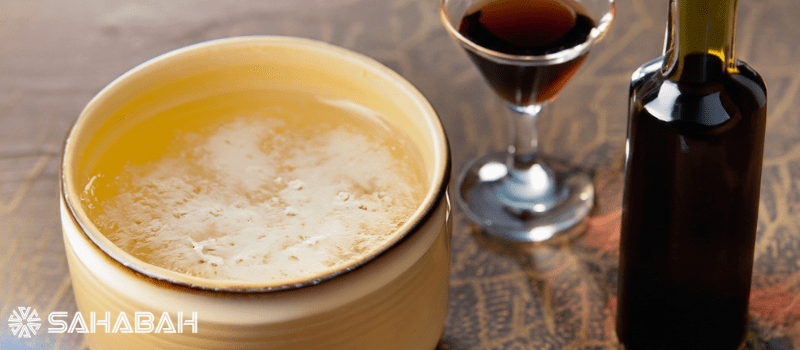As a food enthusiast and advocate for halal consumption, I understand the importance of clarifying misconceptions surrounding the halal status of popular ingredients. In this article, we will delve into the world of mirin, debunking myths and providing alternative options for those seeking halal-certified alternatives.
Determining if Mirin Meets Halal Standards
Mirin is a popular Japanese cooking wine that is commonly used in Asian cuisine. It is made from fermented sweet rice and has a sweet flavor. The purpose of this article is to examine whether mirin is considered halal (permissible) for Muslims to consume.
There are a few key points we will cover in this introduction:
- Definition of mirin
- Mirin is a Japanese cooking wine made from sweet rice that has been fermented
- It has a subtle sweet taste and golden color
- Mirin contains alcohol
- The fermentation process results in an alcohol content typically 14% or higher
- Relevance of mirin’s ingredients and production process for Muslim dietary restrictions
- Overview of halal principles
- Haram prohibited ingredients for Muslims include alcohol, pork, etc.
- Need to check food ingredients’ sources for halal compliance
The article will analyze the evidence on mirin’s halal status from Islamic perspectives and dietary regulations. We will weigh factors like:
- Opinions of halal certification organizations
- Alcohol content and production methods
- Potential substitutes
By the end, we will draw an informed conclusion on whether Muslims can consume mirin based on a comprehensive look at the ingredients and preparation according to halal standards. The goal is to provide useful guidance for Muslims curious about including mirin in their diets.
Background on Halal Dietary Restrictions
To understand the considerations around mirin’s halal status, it is first important to have background on what makes something permissible or prohibited for Muslims to consume.
The Islamic faith provides guidance on dietary regulations that Muslims must follow. This governs what ingredients and foods are deemed:
- Halal: Permissible under Islamic law
- Haram: Prohibited under Islamic law
Some key prohibited ingredients considered haram include:
- Alcohol or intoxicating substances
- Pork or pork byproducts
- Animals that were not slaughtered according to zabiha guidelines
For a food to be halal, it must not contain any haram ingredients or alcohol.
When assessing food ingredients and additives, Muslims must evaluate:
- Source of ingredients
- Processing methods used during production
- Whether cross-contamination with haram substances could have occurred
This background provides context for the analysis of mirin’s permissibility based on its ingredients and production methods according to Islamic dietary regulations.
Evaluating Mirin’s Halal Status
Given the halal dietary restrictions prohibiting alcohol, we can now examine mirin’s ingredients and production process to evaluate its permissibility for Muslim consumption.
Mirin Contains Alcohol from Fermented Rice
The key factor regarding mirin is that it contains alcohol added through a fermentation process.
Mirin is made from sweet rice, or mochigome, which has been saccharified by the addition of koji (aspergillus oryzae) and fermented alcoholically with at least 14% alcohol.
Mirin’s alcohol content comes specifically from the shochu distilled spirit made by fermenting rice.
Typical Alcohol Content 14% or Higher
Most mirin varieties contain a high alcohol percentage, at least 14% and often higher. This exceeds the permissible amounts for halal consumption.
Based on this, any food or drink with an alcohol level of 0.5 percent or more is considered haram. Meanwhile, mirin has an alcohol content of 12 to 14 percent.
Expert Opinions on Mirin’s Halal Status
With its alcohol content in mind, Islamic religious authorities and halal certification organizations have provided the following perspectives on mirin:
Majority View: Mirin is Haram Due to High Alcohol Content
Most major sources state mirin is haram and prohibited for Muslims to consume:
- HaveHalalWillTravel.com
- HalalAdviser.com
- HalalMUI.org
Minority View: Small Amounts in Cooking May be Permissible
A minority of sources say mirin could potentially be allowed in very small quantities:
- IslamQA.org:
The haram alcohol content may be overlooked if it comprises just a small percentage in a food or dish. This would need to be evaluated on a case by case basis.
Halal Mirin Substitutes
For Muslims seeking to avoid mirin, some possible substitutes include:
- Non-alcoholic mirin variety
- Rice vinegar
- Mixture of soy sauce, sugar, etc to emulate mirin flavor
In summary, there is strong evidence that mirin is haram and should be avoided by Muslims, though a minority opinion suggests trace amounts in mixed dishes may be permissible. Halal consumers should be vigilant in checking for mirin or opting for substitutes when cooking.
Frequently Asked Questions – Is Mirin Halal?
What is Mirin?
Mirin is a popular Japanese cooking condiment that is made from fermented rice. It is commonly used to add a sweet and tangy flavor to various dishes.
Is Mirin Halal?
The halal status of Mirin is a matter of debate among scholars. Traditional Mirin contains alcohol, which is generally considered haram (forbidden) in Islam. However, there are certain considerations and substitutes you can use if you are concerned about its halal status.
Does Mirin contain alcohol?
Yes, traditional Mirin contains alcohol. It is often referred to as “sweet rice wine” because of its alcoholic content. This can be problematic for those seeking halal options.
Can Mirin be considered halal?
In general, Mirin is not considered halal due to its alcohol content. However, some argue that the alcohol evaporates during the cooking process, making it permissible in small amounts. It is best to seek advice from a knowledgeable religious authority.
What are the alternatives or substitutes for Mirin?
If you are looking for a halal substitute for Mirin, you can try using rice vinegar or wine vinegar mixed with some sugar. These options can provide a similar tangy flavor to your dishes.
Are there any halal-certified Mirin products available?
Yes, there are some brands that produce halal-certified Mirin-like seasoning or halal Mirin alternatives. These products are made without alcohol and can be used as a substitute in Japanese cooking.
Is Mirin commonly used in Japanese cuisine?
Yes, Mirin is widely used in Japanese cuisine to add depth and flavor to dishes such as sushi, ramen, and various sauces. However, its halal status should be considered if you are following Islamic dietary guidelines.
How does the fermentation process affect the halal status of Mirin?
The fermentation process of Mirin involves the breakdown of sugars in rice, which can naturally produce alcohol. This is why traditional Mirin contains alcohol, making it questionable from a halal standpoint.
Can Mirin be used instead of cooking wine?
While Mirin and cooking wine may have similar flavors, it is important to note that they have distinct differences. Cooking wine is generally not halal due to its alcohol content. If you are looking for
Conclusion
In conclusion, after reviewing the ingredients, production methods, and expert opinions surrounding mirin, the evidence highly suggests that it is haram and prohibited for Muslim consumption:
- Mirin contains alcohol added from fermented rice
- Typical alcohol content is 14% or above
- Majority consensus by halal authorities is that mirin is haram
- Small exception if trace amounts absorbed in certain dishes
While a minority view indicates it may be allowed in tiny quantities during cooking, most standards would prohibit mirin itself.
Based on this, mirin is generally considered haram. It’s best to avoid it unless you can verify the product you’re using is halal certified.
The recommendation based on the evidence is for Muslims to avoid consuming mirin directly or to exercise caution using potential substitutes. General principles of checking ingredients for halal compliance apply.
This analysis aimed to provide a comprehensive perspective on mirin’s permissibility in Islam given its production methods. However, individuals should consult religious authorities for specific guidance when evaluating food ingredients.





